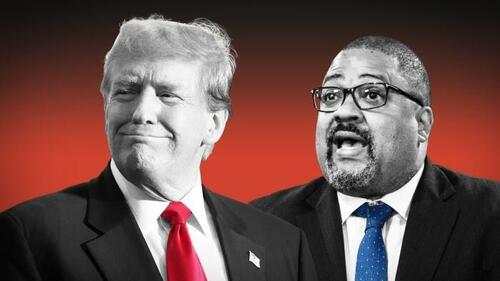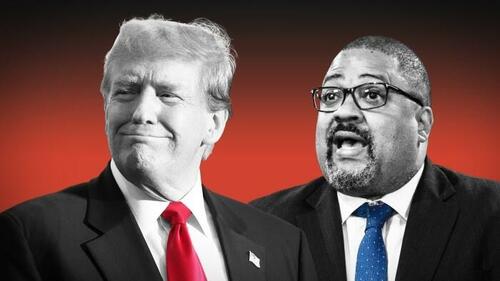The Layaway Presidency: How Alvin Bragg Would Create A New Constitutional Creature
Manhattan District Attorney Alvin Bragg pushed Tuesday to create a new constitutional creature: the layaway president.
It was once common for stores to hold expensive items that you really wanted but could not make the payment.
So they were tagged and kept on the shelf until you were ready to redeem your item.
For Bragg, that leaves Donald Trump tagged until 2029.
In a filing before Manhattan Justice Juan Merchan, Bragg suggested that the court should stay the pending criminal case and defer any sentencing “until after the end of defendant’s upcoming presidential term.”
That would allow a city prosecutor to put a leash on a sitting president for four years.
Trump would govern by the grace of this local judge and district attorney.
In the meantime, pundits and politicians could portray the president as free on a type of work release program.
The suggestion is appalling to most of the people in the country, including the majority of voters who voted for Trump.
Vice President Kamala Harris and Democrats ran on this and other cases in the election.
The result was arguably the largest jury decision in history.
That being said, I do not believe that the mere election of a president negates jury verdicts on 34 criminal counts.
But ample reasons exist to overturn those verdicts or to dismiss this case.
For example, after the verdict, the Supreme Court rendered its immunity decision barring the use of certain evidence against a president.
Some of the evidence used in the Manhattan case likely fell within one of the protected categories.
The prosecutors not only elicited testimony from Trump aides in the White House but then doubled down on the significance of that evidence in their closing arguments.
Merchan could declare that the court cannot rule out the impact of such testimony on the final verdict.
Even if Merchan, as expected, does not dismiss the case on the basis for the immunity decision, the trial was rife with reversible error.
This was a raw exercise of lawfare and Merchan did little to ensure fairness toward the defendant.
Yet none of those errors can be likely addressed until Merchan reaches final decisions on the motion to dismiss as well as the sentencing question.
While that will mean that Trump could, upon possible sentencing, formally become a convicted felon, the matter can then be finally pried out of the hands of Merchan and taken to higher courts for review.
The worst possible option is the one suggested by Bragg, who would adopt the popular persona of Trump’s turnkey.
The President would be seen by many as governing on a type of conditional status from one of the most politically compromised prosecutors in the country.
For Bragg and other Trump opponents, that may be far more satisfying than a sentencing now given the unlikelihood of any jail component.
After the years and millions spent on the case, it would be the ultimate buzz kill to have Trump sentenced to some fine or other non-carceral penalty.
Many Democrats want to have Trump govern with an asterisk of a “President pending sentencing.”
Instead, Trump would govern with the clock ticking toward a sentencing date.
It is a dangerous precedent. Such pending sentences can have a coercive impact on a president in dealing with given officials, including a state governor who might be willing to pardon a president.
Consider the effort of the governor of New York in restoring the lucrative state and local tax, or SALT, deductions.
There is no reason to believe that Trump would succumb to such leverage (and he has already indicated that he would consider the change).
However, any decision on policies like SALT would be the subject of speculation of whether a reduction in taxation was made in the hope of a reduction in incarceration.
Critics would suggest that New York is yanking on the leash to achieve policy advantages.
This is the same judge and prosecutor who gagged the leading candidate for the presidency in discussing aspects of the case in the months leading up to the election.
Now, they would allow him to govern pending their own suspended decisions on his future.
The Trump case was always a thrill kill for Bragg.
Under Bragg’s proposal, his supporters would prolong that thrill for four more years.
The cost, however, would be devastating for the country.
This country needs a president, not a president on layaway from the Manhattan District Attorney.
* * *
Jonathan Turley is the Shapiro professor of public interest law at George Washington University and the author of “The Indispensable Right: Free Speech in an Age of Rage.”
Tyler Durden
Wed, 11/20/2024 – 14:45


